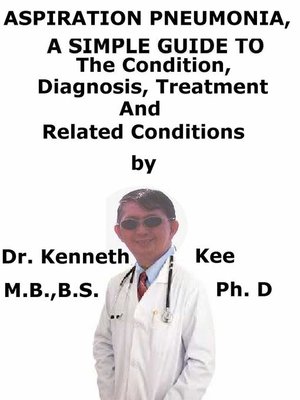Aspiration Pneumonia, a Simple Guide to the Condition, Diagnosis, Treatment and Related Conditions
ebook
By Kenneth Kee

Sign up to save your library
With an OverDrive account, you can save your favorite libraries for at-a-glance information about availability. Find out more about OverDrive accounts.
Find this title in Libby, the library reading app by OverDrive.



Search for a digital library with this title
Title found at these libraries:
| Library Name | Distance |
|---|---|
| Loading... |
This book describes Aspiration Pneumonia, Diagnosis and Treatment and Related Diseases
Recently my father who was ninety nine years old died of aspiration pneumonia while in hospital because of problem swallowing (dysphagia).
There was no fever.
He also had advanced bladder cancer.
Pneumonia is a breathing disorder in which there is swelling or an infection of the lungs or infected large airways.
It is the second commonest cause of death in Singapore.
Aspiration pneumonia is a lung infection induced by inhaled oral or gastric contents.
It can become severe if left untreated.
Aspiration pneumonia happens when food, saliva, liquids, or vomit is inhaled into the lungs or airways extending to the lungs, instead of being swallowed into the esophagus and stomach.
Aspiration pneumonia is a dangerous sequel to pulmonary aspiration.
Pulmonary aspiration happens when the patient inhale particles, stomach acid or saliva into the lungs.
The patient can also aspirate food that refluxes back up from the stomach to the esophagus.
All of these things may contain bacteria that involve the lungs.
Healthy lungs can recover by themselves.
If they do not, pneumonia can occur as a complication.
Causes
The type of bacteria that caused the pneumonia is dependent on:
1. The health
2. The location of the patient (at home or in a long-term nursing facility or hospital)
3. If the patient was recently hospitalized
4. The recent antibiotic use
5. Whether the immune system is weakened
Pneumonia from aspiration can happen when the defenses are impaired and the aspirated contents have a large quantity of harmful bacteria.
The patient can aspirate and develop pneumonia if the food or drink enters the airway instead of stomach.
This may happen even if the patient can swallow normally and have a normal gag reflex.
In that case, most of the time the patient will be able to stop this by coughing.
Those who have impaired coughing ability may not be able to do so easily.
This impairment may be because of:
1. Neurological disorders
2. Throat cancer
3. Medical disorders like myasthenia gravis or Parkinson's disease
4. Excessive use of alcohol or prescription or illegal drugs
5. Use of sedatives or anesthesia
6. A weakened immune system
7. Esophageal disorders
8. Dental disorders that disrupt chewing or swallowing
Risk factors for breathing in (aspiration) of foreign substance into the lungs are:
1. Being less alert due to medicines, illness, or other reasons
2. Coma
3. Drinking large quantities of alcohol
4. Receiving medicine to put the patient into a deep sleep for surgery (general anesthesia)
5. Old age
6. Poor gag reflex in people who are not alert (unconscious or semi-conscious) after a stroke or brain injury
7. Problems with swallowing
Diagnosis
The doctor will check for signs of pneumonia during a physical exam, such as:
1. A decreased flow of air,
2. Rapid heart rate, and
3. A crackling sound in the lungs.
The doctor will listen with his stethoscope for crepitations (rales) or abnormal breath sounds when listening to the chest.
If pneumonia is indicated, the doctor will likely order a chest x-ray.
These tests may also help diagnose this disorder:
1. Arterial blood gas
2. Blood culture
3. Bronchoscopy (uses a special endoscope to view the lung airways)
4. Full blood count (FBC)
5. CT scan of the chest
6. Sputum culture
7. Swallowing tests
Treatment
The treatment requires antibiotics and supportive care for...







